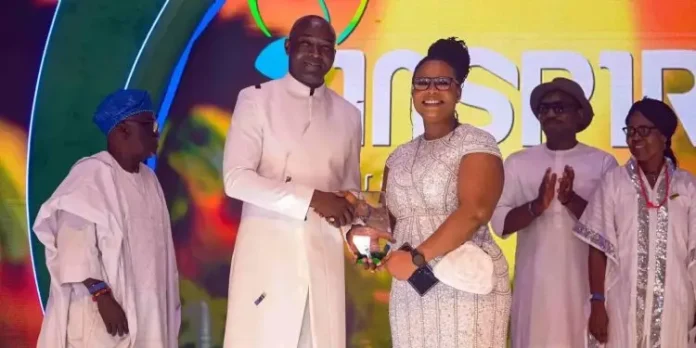News Investigators/ Nigerian-born author and cultural storyteller, Oyindamola Olugbile, has won the 2025 NLNG-sponsored Nigeria Prize for Literature, defeating Chigozie Obioma and Nikki May.
The Nigeria Prize for Literature, established in 2004, is one of the country’s most prestigious literary awards.
The Advisory Board for the Prize, chaired by Prof. Akachi Adimora-Ezeigbo, announced Olugbile’s victory at the award ceremony held on Friday night in Lagos.
Ms Olugbile clinched the coveted prize with her debut novel, “Sanya”, beating Obioma’s “The Road to the Country” and May’s “This Motherless Land.”
A graduate of the University of Lagos with a B.A. (Hons) in Creative Arts, Olugbile also holds postgraduate certificates from Lagos Business School, Harvard Business School Online, and the School of Politics, Policy and Governance (SPPG).
She earned an MSc from King’s College London and works as a Social Impact Management Consultant.
Her debut novel, “Sanya,” explores themes of love, loss, and redemption against the backdrop of a mystical empire enchanting even to the Òrìṣà.
She is also the Chief Curator of the Experience Factory, an education enterprise that curates out-of-classroom learning experiences for young people.
Adimora-Ezeigbo described the adjudication process as intense and meticulous, noting that the eleven longlisted books were all remarkable.
“The challenges faced by the judges this year were both daunting and unprecedented,” she said. “Each work distinguishes itself through masterful plotting, characterisation, and language that transports readers into imagined worlds.
“These are not merely stories; they are carefully woven realities, compelling in beauty, stirring in emotion, and unflinching in their engagement with urgent societal issues.
“Our task was clear, to choose the most deserving laureate. This cycle has been one of the most competitive yet, and every entry stretched our judgment to the limit,” she added.
Olubunmi Familoni won the 2024 edition of the prize with his book, “The Road Does Not End”.
In his remarks, the Chief Executive Officer of Nigeria LNG Ltd. (NLNG), Mr Philip Mshelbila, said the Prize underscores the enduring power of literature to shape identity and deepen understanding.
“Winning the Prize is recognition of scaling the highest heights of literature. All the shortlisted books are of the highest calibre,” he said.
Mshelbila announced that The Nigeria Prize for Science would be renamed The Nigeria Prize for Science and Innovation to reflect NLNG’s belief that progress depends as much on creativity and fresh thinking as on technology and infrastructure.
He also revealed that NLNG would rest The Nigeria Prize for Literary Criticism and introduce a new category, The Nigeria Prize for Creative Arts, focusing on documentary film.
He said the new prize would inspire a new generation of storytellers to inform, challenge, and connect Nigerians more deeply to their identity and aspirations.
On energy, Mshelbila said, quoting the International Energy Agency, that Africa requires over $200 billion annually in energy investments to meet its climate and development goals.
He noted that Nigeria has both the capacity and responsibility to lead this effort.
“Every kilometre of pipeline, every processing plant, and every household gas cylinder represents opportunity. Train 7, now over 80 per cent complete, is a $10 billion demonstration of what happens when policy, planning, investment, and execution align,” he said.
He described the project as a clear example of Nigerian content development and proof that the country can remain competitive in the global LNG market with focus, coordination, and ambition.
During the ceremony, Mshelbila also unveiled “Voices of Our Leaders,” a commemorative book chronicling NLNG’s 35-year journey and the voices that shaped its evolution.
The Minister of Education, Dr Tunji Alausa, who delivered the keynote address, commended the achievements celebrated at the event but urged reflection on the nation’s broader developmental goals.
He noted that The Nigeria Prize for Science had no winner in 2025 under the theme “Innovations in ICT, Artificial Intelligence (AI), and Digital Technologies for Development”.
“This is a reminder that without innovation, Nigeria cannot hope to compete in a digital future,” Alausa said.
He called for deeper investment in science, AI, and digital technologies as tools for national advancement.
Alausa urged Nigerians to rededicate themselves to nurturing both science and the arts, strengthening education, and investing in sustainable energy for inclusive development.
NAN
•


